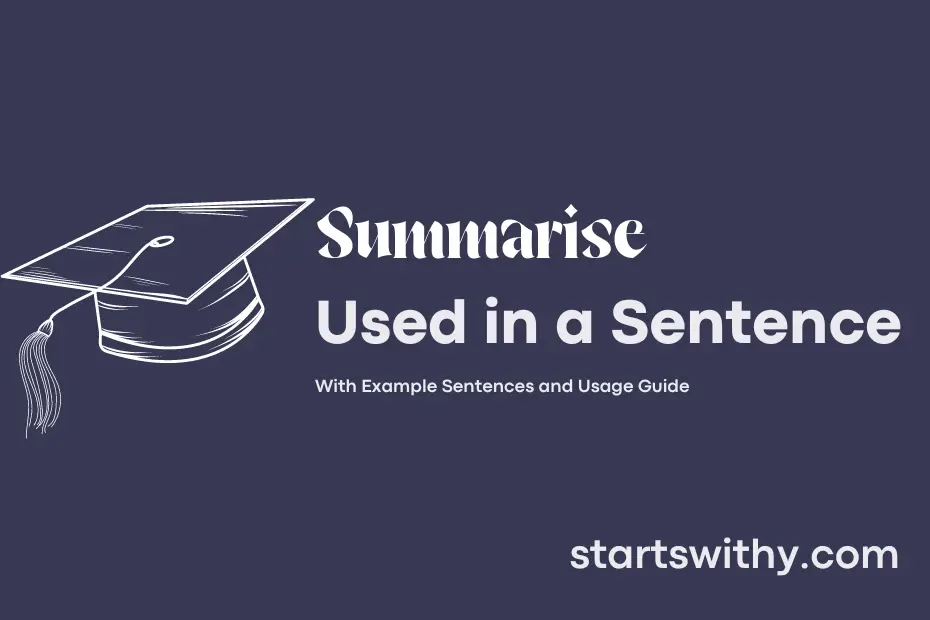Have you ever struggled to condense a lengthy passage into a concise version? This is where the art of summarising comes into play. To summarise means to capture the main points of a text or discussion in a brief and clear manner.
Summarising requires analyzing the key components of the information and presenting them in a condensed form. It is a valuable skill in academic, professional, and everyday settings, helping to convey the essence of a complex topic efficiently.
7 Examples Of Summarise Used In a Sentence For Kids
- Summarise means to tell the most important parts of something.
- We can summarise a story by talking about the beginning, middle, and end.
- Let’s summarise what happened in the movie we watched yesterday.
- Can you summarise your favorite book in just a few sentences?
- It’s important to summarise information to help us understand it better.
- When we summarise, we make things easier to remember.
- Let’s practice how to summarise by talking about our weekend adventures.
14 Sentences with Summarise Examples
- Before the exam, it’s important to summarise your notes to help you retain information better.
- When reading long textbooks, it can be helpful to summarise each chapter as you go along.
- For group projects, divide the work among team members and summarise your findings to present to the class.
- After attending a lecture, take time to summarise your notes while the information is still fresh in your mind.
- When writing essays, it’s crucial to summarise your main points in the conclusion to reinforce your argument.
- To prepare for a debate, summarise the key points of both sides to strengthen your arguments.
- When studying for exams, create flashcards to help you summarise important information quickly.
- In research papers, summarise the results of your experiments to provide a clear overview of your findings.
- During presentations, summarise complex ideas into simple, easy-to-understand points for your audience.
- To review for midterms, summarise the main concepts covered in class to refresh your memory.
- After completing a research article, summarise the main findings to share with your peers.
- When revising for finals, create study guides that summarise key concepts to make studying more manageable.
- Before submitting assignments, summarise your main arguments and conclusions in the introduction.
- When collaborating on group projects, summarise your individual contributions to demonstrate your involvement.
How To Use Summarise in Sentences?
Summarise is a useful tool that can help you condense large chunks of information or text into a shorter, more concise form. To use Summarise effectively in a sentence, you first need to identify the key points or main ideas of the text you want to summarize. Then, you can use Summarise to highlight the essential details in a brief and clear manner.
When using Summarise in a sentence, start by introducing the text or topic you are summarizing. For example, “To summarise the article on climate change, the main points are…” Next, provide a concise overview of the key points without going into too much detail. You can use phrases like “In short,” “To sum up,” or “Overall,” to signal that you are about to provide a summary.
Remember to focus on the most important information and leave out any unnecessary details when using Summarise. Aim to capture the essence of the text in a few sentences or bullet points. This will help you convey the main ideas quickly and effectively.
In conclusion, using Summarise in a sentence is a valuable skill that can help you communicate complex ideas in a more digestible format. Practice summarizing different types of texts to improve your summarization skills and become more proficient at using Summarise in your writing.
Conclusion
In summary, it is essential to master the skill of creating effective sentences with summarising to convey information concisely. By using summarising in sentences, you can distill complex ideas or large amounts of information into clear, succinct statements. This can improve the readability and impact of your writing, ensuring that your audience easily grasps the key points you are trying to communicate.
Whether you are writing an academic paper, a business report, or simply expressing your thoughts, the ability to summarise in sentences enables you to highlight the most important aspects of your message. Practice crafting sentences that summarise effectively to enhance the clarity and effectiveness of your writing, ultimately making your communication more impactful and engaging.



